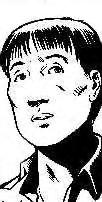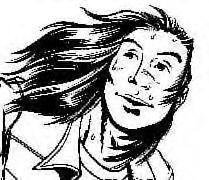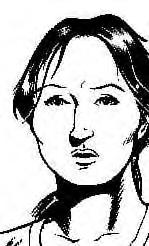|
|
Culture and Comics Need Multicultural Perspective Tall Oak, a Narragansett quoted in the documentary "500 Nations," calls Indians
the conscience of America. "The lesson," he
says, "is to realize the value of an alternative perspective. And that is why
we are here. That is why the Creator allowed some of us to remain, in spite of all the attempts to destroy us." Unfortunately, the frontier mentality is embedded deeply in the American psyche. It's
pervasive in every form of popular entertainment, from sports to TV to comic books. How many times has the lone
hero, a James Bond or Luke Skywalker, defeated the forces of evil against insurmountable odds? By providing another perspective, multicultural products challenge our predominant myths.
But it's difficult to find such voices in today's media As the smallest and most at-risk minority, Native Americans provide a case study of how
mainstream society ignores other viewpoints. As an indigenous people with non-Western roots, they also suggest
an antidote to our monocultural beliefs. Racism Here and Now Most people consider blatant racism a thing of the past. But as the 21st century dawns,
minority stereotyping and slighting still occur too often. A few recent examples:
Comics Mirror Society Native Americans have made strides in comic books. A dozen or two significant characters
exist. But few of them are leaders or stars. No Native American ... indeed, no minority superhero except the Black
Panther (a holdover from the '60s) and the X-Men's Bishop--is on the title of a DC or Marvel comic. How does the prevailing attitude express itself in comics, and what's the alternative?
Consider the following: Rob Schmidt publishes PEACE PARTY, a multicultural comic book featuring
Native Americans. For more information, visit Peace Party Blue Corn Comics Launches Contests for Youth If you know someone who might be interested, please pass this message along.
article and artwork contributed by Rob Schmidt editor
of Peace Party Comics
 With violence headlining the news around the globe, a multicultural perspective has never been more
relevant than now. No longer does "rugged individualism" or "might makes right" seem the answer
to every dilemma. Even jaded Americans, sure of their own superiority, are beginning to ask what's happening.
With violence headlining the news around the globe, a multicultural perspective has never been more
relevant than now. No longer does "rugged individualism" or "might makes right" seem the answer
to every dilemma. Even jaded Americans, sure of their own superiority, are beginning to ask what's happening. onslaught. Few minority creators
have the resources to break through the noise.
onslaught. Few minority creators
have the resources to break through the noise.
 American
comic books and cartoons are a leading influence on today's pop culture. As a recent Wall Street Journal article
said, "Comic books...remain a rich source of movie scripts and video-game material." One could cite everything
from Batman to the Teenage Mutant Ninja Turtles to Pokemon as examples.
American
comic books and cartoons are a leading influence on today's pop culture. As a recent Wall Street Journal article
said, "Comic books...remain a rich source of movie scripts and video-game material." One could cite everything
from Batman to the Teenage Mutant Ninja Turtles to Pokemon as examples.
 People around
the world see Americans as having a cowboy mentality. Ours is "a culture that confirms the stereotype of the
individual as solitary gunslinger and society as a hostile frontier," as an LA Times article put it. Whether
we're talking about John Wayne, Rambo, or the Punisher, the answer to our cultural myopia is a multicultural perspective.
People around
the world see Americans as having a cowboy mentality. Ours is "a culture that confirms the stereotype of the
individual as solitary gunslinger and society as a hostile frontier," as an LA Times article put it. Whether
we're talking about John Wayne, Rambo, or the Punisher, the answer to our cultural myopia is a multicultural perspective.
http://members.xoom.com/peaceparty.
"Create a Native Superhero" Joins Fun-Filled Lineup
With these challenging new contests, we hope to spur kids to use the Internet, develop their creative and storytelling
skills, and become interested in Native culture and history. For details, visit http://members.xoom.com/peaceparty/pr5.htm.
![]()
|
|
| Canku Ota is a free Newsletter celebrating Native America, its traditions and accomplishments . We do not provide subscriber or visitor names to anyone. Some articles presented in Canku Ota may contain copyright material. We have received appropriate permissions for republishing any articles. Material appearing here is distributed without profit or monetary gain to those who have expressed an interest. This is in accordance with Title 17 U.S.C. section 107. |
|
Canku Ota is a copyright of Vicki Lockard and Paul Barry. |
|